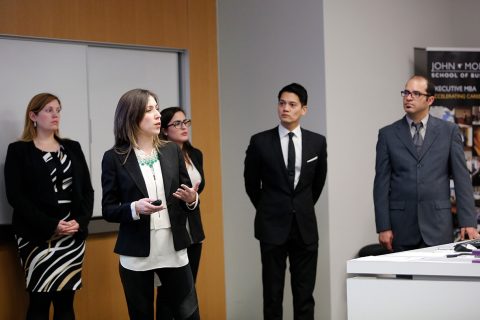Supply Chain Management (MSCM)
Program overview
The Master of Supply Chain Management (MSCM) at Concordia’s John Molson School of Business is a forward-looking graduate program that unites core Supply Chain Management disciplines with advanced data analytics, artificial intelligence, and Environmental, Social, and Governance principles. Through experiential learning, faculty-led research, and industry projects, students build depth in design and planning, sourcing and logistics, production and operations, optimization and decision-making, and sustainability and risk management – graduating with the strategic mindset and analytical rigor to lead responsible, high-impact supply chains in a globally connected world.
Program structure
Degree Requirements
Fully-qualified candidates are required to complete a minimum of 45 credits.
Please see the Supply Chain Management (MSCM) Seminars page for course descriptions.
Supply Chain Management MSCM (45 credits)
| 6 | credits of Core Seminars
|
| 15 | credits of Supply Chain Management Seminars: |
| 3 | credits of Elective Seminars chosen from: |
Notes: Taking an elective seminar is subject to the academic advisor’s approval. At most one elective seminar at the graduate level can be taken outside of the John Molson School of Business. Each year a selection of specialized seminars are offered on a rotating basis from those listed above. | |
| 21 | credits: |
This program offers a co-op option — a paid, full-time internship of four or eight months where you'll put classroom learning into practice.
Admission requirements
Admission Requirements
- High academic standing in one of the following degrees: bachelor's degree in Commerce (or equivalent) with a major in any business discipline; bachelor's degree in any of the engineering disciplines; bachelor's degree in Economics / Mathematics / Applied Sciences.
- B average in the final two years of their undergraduate studies and have obtained a Grade Point Average (GPA) of at least 3.00 on a 4.30 scale, or the equivalent, from an accredited university.
- Applicants must submit proof of satisfactory performance on the Graduate Management Admission Test (GMAT) or the Graduate Record Examination (GRE) completed within the previous five years, two letters of recommendation with the Academic Assessment forms and a short statement of purpose. (Please note that the GMAT is preferred to the GRE).
- Proficiency in English. Applicants whose primary language is not English must demonstrate that their knowledge of English is sufficient to pursue graduate studies in their chosen field. Please refer to the English language proficiency page for further information on requirements and exemptions.
Application process
Application deadlines

FALL
February 1

WINTER
n/a

SUMMER
n/a
Priority will be given to complete applications submitted by the deadline. In some cases, programs may continue to accept applications as long as there is space available.
International students: Considering the waiting period involved in meeting the entry requirements to Canada and Quebec, we strongly encourage international applicants to apply early and submit supporting documents prior to the deadline.
Tuition & funding
Tuition and fees
Tuition and fees of the program may depend on your student status, among other key factors. Estimate these costs based on the most common situations.
Awards and funding
Funding packages are generally available for students in thesis-based programs. They come in the form of awards, teaching and research assistantships are offered at the time of admission to most students to allow them to focus on their research and studies. Research and thesis-based students are automatically considered for all entrance graduate awards when they apply to Concordia, provided they meet eligibility criteria. No separate application is required.
The Quebec and Canadian governments offer a number of competitive graduate scholarships. We encourage you to apply for these awards at the same time you are preparing your application.
Out-of-province students
Get $10,000 in special funding for thesis master's programs. Learn more
Other programs of interest

Practical. Flexible. Experiential. Advance your career with the John Molson MBA program that focuses on your goals. Choose the hands-on approach to business education with an interdisciplinary curriculum emphasized on case studies.
Faculty

Challenge yourself and deepen your skill set in the John Molson EMBA alongside a cohort of seasoned professionals and professors with global expertise. Join a program that's rooted in real-world experience and become a leader of change.
Faculty

